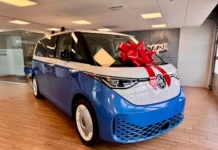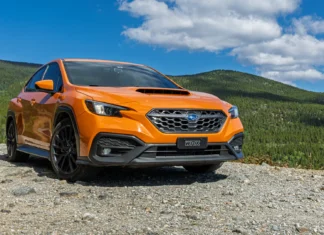It’s all about electric cars here.
For decades, we’ve lived under the umbrella of internal combustion, thanks to increasingly advanced gasoline and diesel engines. As we tick over into 2020, though, the winds are shifting and a new wave of electric cars are emerging onto the scene. We have Tesla at the forefront of this movement, and other “legacy” manufacturers are jumping in as well. Before we move into the latest EV era, however, we wanted to sample one of the last examples of a bygone decade. Enter the 2019 Volkswagen e-Golf SEL Premium.
VW started field testing the e-Golf back in the early 2010s, but production versions didn’t hit the market until the 2015 model year. With less than 100 miles of range and slower charging capability, this car wasn’t practical for the way most Americans drive, and as such only went on sale in certain EV-friendly states like California. This 2019 model has improved range of 125 miles, a larger 35.8-kWh battery, more power, and better technology like Volkswagen’s Digital Cockpit.
More importantly, for this model year all Volkswagen e-Golfs — even the base SE — get DC fast charging capability as standard equipment. However, while the range has improved, the e-Golf still only manages 125 miles on a charge per the EPA, falling well short of its modern competition like Tesla as well as the Nissan Leaf, Hyundai Kona Electric, Kia Niro EV, and Chevrolet Bolt, among others.

Loveland Trials: ‘World’s Toughest EV Test’
We at the TFL office are laying down a new challenge for electric cars of the present and the future. Right now, we have the Volkswagen e-Golf on a long-term loan to see just how easy it is to live with, and that includes driving it in real-world conditions. As we happen to live near the Rocky Mountains, that includes putting the EV under stresses that will test its effective battery range to its limits. We’re calling it the ‘Loveland Trials’, and the objective is fairly straightforward.
From our office in Boulder, Colorado, we’ll drive the latest EVs to the top of Loveland Pass on the Continental Divide — a trip that’s about 80 miles one-way. However, there’s also an elevation gain of 6,000 feet along that journey, forcing any EV to expend more of its energy handling the tough includes. However, it also tests the electric car’s ability to regenerate energy on the way back down. Put them together, and most of today’s electric cars should be able to manage the journey to Loveland Pass and back to Boulder on a single charge. We’re also judging its livability by just how quickly you can charge it using DC fast charging should the need arise.
Scoring system
We’re scoring the Loveland Trials in three main categories:
- Effective Range = 300 miles after Trials (30 points)
- 10 points off for every 100 miles under 300 after the Loveland Trials
- i.e. 300 = 30; 200 = 20; 100 = 10
- Charging Capability = 80% SoC in 5 minutes (30 points)
- 5 points off for every 10 minutes over up to an hour
- Anything over 1 hour = automatic fail
- Autonomous Driving = Level 5 (total autonomy) (30 points)
- 6 points for each ‘level’ under L5
- i.e. Level 1 (lane keep, adaptive cruise control) = 6 points
- Last 10 points are subjective
On that last part, autonomous capability is also an inevitable part of our driving future. Eventually, that “driving” part will be elective, but for now we humans still have to maintain control. As such, modern EVs can’t get a perfect score on this test just yet. However, as we inch near Level 5 (or complete autonomy), new electric cars will score highly on this test.
500 miles of total range is the ideal for our Loveland Trials EV testing. Mind you, we’re considering future electric cars for this test as well as current ones, so this takes into account future improvements in battery technology. On the 160-mile trip, if the electric car still has more than 300 miles remaining, then it will get a perfect score, as it has over 500 miles. Anything less than that, and we start knocking off points.
When it comes to charging capability, the main factor that will get people to switch over to EVs is how quickly the system can replenish the battery. Right now DC fast charging is still too slow, with 50 kW systems taking over an hour to recharge a decently sized battery. Tesla’s Superchargers fare much better, and the stations are also improving over time. Cars like the Porsche Taycan charge much more rapidly, but are also ludicrously expensive at the moment. As infrastructure and charging times improve, living with an electric car will be no different than taking a conventional car to a gas station. Until then, though, dealing with long charging times will be an inconvenience.

2019 Volkswagen e-Golf score
The newest VW e-Golf is a solid choice for a city runabout, as I’ve said. However, we’ve designed this test against it. VW’s only current electric car is the last remnant of a bygone era, whereas newer electric cars will feature better range and much better charging times, in addition to more autonomous features. The company’s new ID. series will take things to the next level, and more manufacturers will join the movement, pushing the whole industry forward.
For now, the 2019 Volkswagen e-Golf earns a miserly 14.8 out of 100 points in this Loveland Trials. It failed the test on range, requiring a top up in Golden, Colorado to make it to Loveland Pass and back. Its charging times are far too slow, and it only has basic autonomous driving features akin to most modern conventional cars. But stay tuned, as we test more capable electric cars and really put new EVs (and the Loveland Trials challenge) to the test!
For more on the new e-Golf, check out the video below:























